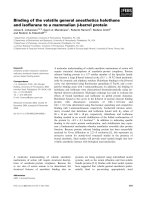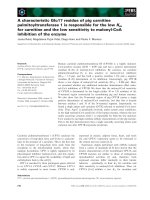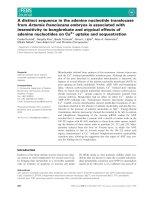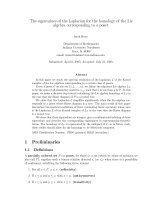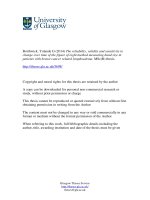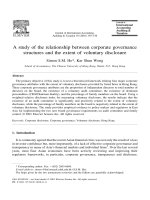d. to stay --> b 114. A artist went to a beautiful part of the country for a holiday, and stayed pdf
Bạn đang xem bản rút gọn của tài liệu. Xem và tải ngay bản đầy đủ của tài liệu tại đây (86.14 KB, 28 trang )
d. to stay
> b
114. A artist went to a beautiful part of the country for a holiday, and stayed with
a farmer.
a. A
b. to
c. beautiful
d. for
> a
115. The artist was very pleased and thanked the farmer for saying so kind
things about the paintings.
a. pleased
b. saying
c. so
d. about
> c
116. Several members of his family did a great deal to encourage him in the field
of scientific.
a. Several
b. to encourage
c. in
d. scientific
> d
117. While he dealt with the deaf and investigating the science of acoustics, his
studies eventually led to the invention of the multiple telegraph and his greatest
invention - the telephone.
a. dealt
b. investigating
c. eventually
d. invention
> b
118. Along in jogging and swimming, cycling is one of the best all-round forms of
exercise.
a. in
b. cycling
c. one
d. of
> a
119. It can help to increase your strong and energy, giving you more efficient
muscles and a stronger heart.
a. to increase
b. strong
c. giving
d. stronger
> b
120. Doing too much too quickly can damage muscles that aren't used to work.
a. Doing
b. quickly
c. aren't
d. to work
> d
121. If you had any doubts about taking up cycling for health reasons, talk to your
doctor and ask his or her advice.
a. had
b. about
c. talk
d. ask
> a
122. The decay begins in a little crack in the enamel to cover of the tooth.
a. begins
b. a little
c. to cover
d. of
> c
123. We should eat food that is good at our teeth and our body.
a. should
b. is
c. at
d. teeth
> c
124. Some accidents cause injuries but some lead to die.
a. cause
b. but
c. some
d. die
> d
125. The Transport Department organizes road safety campaigns every year in
order that reduce traffic accidents.
a. Transport
b. safety
c. in order that
d. accidents
> c
126. If everyone takes care when crossing the road, there will be more traffic
accidents.
a. If
b. takes
c. crossing
d. more
> d
127. Coffee and tea is favorite hot drinks of people in all parts of the world.
a. and
b. is
c. drinks
d. in
> b
128. In the United States, which more coffee is used than in any other nation,
many people drink their coffee " black", without cream or sugar.
a. In
b. which
c. any
d. without
> b
129. In China, Japan and other Oriental countries, where tea is the national drink,
people almost use never sugar in their tea.
a. Oriental
b. where
c. almost
d. never
> d
130. Richard leaves at home at about half past eight, with his schoolbag under
his arm.
a. at
b. about
c. with
d. under
> a
131. He doesn't buy a ticket every day so he has a season ticket.
a. doesn't
b. a
c. so
d. season
> c
132. Schools in England are not the same from in our country.
a. Schools
b. are not
c. from
d. our
> c
133. In England school children do not go to school on Saturdays with Sundays.
a. children
b. school
c. on
d. with
> d
134. In some places, winter begins in November and ending in March or April.
a. In
b. begins
c. ending
d. or
> c
135. You can see a lot of childs running and jumping in the snow or playing with
snowballs.
a. see
b. childs
c. in
d. playing
> b
136. One day their mother took them in their aunt's house to play while she went
to the big city to buy some new clothes.
a. took
b. in
c. while
d. some
> b
137. Two old gentlemen lived in a quite street in Paris.
a. gentlemen
b. in
c. quite
d. Paris
> c
138. They went often for walks together in the streets when the weather was fine.
a. often
b. together
c. when
d. was
> a
139. In England nobody under the age of eighteen are allowed to drink in a public
bar.
a. In
b. nobody
c. are
d. to drink
> c
140. There is a prison in iceland which allows its prisoners going out without any
guards to work everyday.
a. is
b. allows
c. going
d. to work
> c
141. Mary and her husband wanted to give the old lady to a nice birthday
present.
a. her
b. to give
c. to
d. nice
> c
142. He is such famous that he has a great many fans.
a. is
b. such
c. has
d. fans
> b
143. The police caught he because he was involved in a robbery.
a. police
b. he
c. because
d. in
> b
144. If he doesn't understand the lesson, his father often explains it for him.
a. understand
b. his
c. often
d. for
> d
145. Most of the building in this town are rather unattractive, but this church is an
exception.
a. of
b. building
c. rather
d. but
> b
146. She has a strongly determination to be a teacher.
a. has
b. strongly
c. determination
d. be
> b
147. The government are trying playing down their involvement in the affair.
a. are
b. playing
c. their
d. in
> b
148. The expansion of this factory will to create more employment to local
people.
a. expansion
b. this
c. to create
d. local
> c
149. There is a chill striking me when I go alone in night.
a. is
b. striking
c. when
d. in
> d
150. This morning, I encountered a friend I haven't seen for a long times.
a. encountered
b. haven't
c. for
d. times
> d
151. It is possible to infer two completely opposite conclusion from this set of
facts.
a. is
b. to infer
c. completely
d. conclusion
> d
152. He is not very sanguine about his chances of successful.
a. very
b. sanguine
c. about
d. successful
> d
153. She admires Korean actresses in so far as she wears as them.
a. admires
b. actresses
c. as
d. them
> c
154. She presented reward for the return of her lost bracelet.
a. presented
b. for
c. of
d. lost
> a
155. We are interested of the conservation of forests.
a. interested
b. of
c. conservation
d. of
> b
156. I think there are any resources that we have left untapped.
a. are
b. any
c. that
d. untapped
> b
157. He enrichs his knowledge by listening to the radio every night.
a. enrichs
b. knowledge
c. listening
d. every night
> a
158. We have searched for some of the books to which you need.
a. have
b. for
c. books
d. to which
> d
159. It is many years for Mount Vesuvius last erupted.
a. is
b. years
c. for
d. last
> c
160. Reforming the education system will be a difficulty process.
a. Reforming
b. system
c. will
d. difficulty
> d
161. I found it hardly to keep my concentration with such a noise going on.
a. it
b. hardly
c. concentration
d. such
> b
162. I keep my reference books near in my desk for convenience.
a. keep
b. reference
c. near in
d. convenience
> c
163. Put the cap back on the bottle, otherwise the juice would spill.
a. Put
b. on
c. otherwise
d. would
> d
164. All pilots are responsible for their passengers' safe.
a. pilots
b. responsible
c. for
d. safe
> d
165. The country air are fresh, moreover, it is not polluted.
a. country
b. are
c. moreover
d. polluted
> b
166. I always make a point of checking that all the windows are shut after I go
out.
a. make
b. checking
c. all
d. after
> d
167. We are having a little get-together to celebrate David promotion.
a. having
b. a little
c. to celebrate
d. David
> d
168. She is enough old to be independent of her parents.
a. old
b. to be
c. of
d. parents
> a
169. The train he got on has an accident but he was unharmed.
a. he
b. has
c. but
d. was
> b
170. You need attach a label to each piece with luggage.
a. need
b. a
c. to
d. with
> d
171. You should wear conspicuous clothes when to walk at night.
a. wear
b. when
c. to walk
d. at
> c
172. She made a few conventional remark about the weather.
a. made
b. conventional
c. remark
d. the
> c
173. She can look back on her career with greatly satisfaction.
a. look
b. on
c. with
d. greatly
> d
174. I feel a certain apprehension with my interview tomorrow.
a. feel
b. certain
c. with
d. tomorrow
> c
175. What was she said convinced me that I was mistaken.
a. was
b. said
c. me
d. mistaken
> a
176. A well tool-box is a handy thing to have in the house.
a. well
b. handy
c. to
d. in
> a
177. One of his less attractive trait is criticizing his wife in public.
a. of
b. less
c. trait
d. in
> c
178. The driver was tooting his horn as he reached the bend.
a. The
b. was tooting
c. as
d. reached
> b
179. Try to more positive in dealing with the problem.
a. Try
b. to
c. in
d. with
> b
180. She had real psyched herself up for the big match.
a. had
b. real
c. herself
d. for
> b
181. When life was simple, man's needs were few and he could supply their all.
a. When
b. was
c. few
d. their
> d
182. The woman who come in does not know the man well.
a. woman
b. come
c. know
d. well
> b
183. I live in Elgol, is a small village on the south-west coast of the island.
a. live
b. is
c. on
d. of
> b
184. I stop for passengers and empty the five post box along the road.
a. for
b. and
c. box
d. along
> c
185. I pick up the school children that live along my route and took them to the
school in Broadford.
a. up
b. that
c. took
d. to
> c
186. There are a school for young children in Elgol, but the older children have to
travel into the town.
a. are
b. for
c. in
d. older
> a
187. Sometimes it takes me about three hours finishing my round.
a. Sometimes
b. me
c. hours
d. finishing
> d
188. Stories are the goodest way of teaching moral lessons to young people.
a. goodest
b. teaching
c. moral
d. to
> a
189. I talk about the Tower of London, and then of the lives of people in England
today.
a. the
b. and
c. of
d. lives
> c
190. Sun Jingxiu, a 80-year-old retired teacher, is the oldest storyteller in the
country.
a. a
b. retired
c. oldest
d. in
> a
191. Small children doesn't understand that hot water and hot drinks can be
dangerous.
a. doesn't
b. that
c. drinks
d. be
> a
192. More oftenly the children have fallen through a glass door or window and
are badly hurt.
a. oftenly
b. have
c. through
d. badly
> a
193. The two young woman are watching people dancing, and waiting for an
invitation to join in.
a. woman
b. watching
c. waiting
d. to join
> a
194. Her dark dress reflects a view of life which is many less optimistic.
a. dark
b. reflects
c. which
d. many
> d
195. I spent an hour trying to find a phone so that I could ring you telling you I'd
be a little late this morning.
a. spent
b. to find
c. so that
d. telling
> d
196. I wanted something fresh to eat while I were in Britain.
a. something
b. to eat
c. were
d. in
> c
197. In towns, there was very few bus shelters until about thirty years ago.
a. In
b. was
c. until
d. years
> b
198. Most people no longer wears the kinds of clothes that protect them from the
wind, cold and rain.
a. Most
b. wears
c. that
d. from
> b
199. Most of them were build in the nineteenth century and some are very grand.
a. of
b. build
c. nineteenth
d. are
> b
200. They were intended to persuade people to drink water, instead with beer or
spirits.
a. were
b. to persuade
c. to drink
d. with
> d
201. Communication will be impossible if everyone made up his own language.
a. Communication
b. will
c. if
d. his
> b
202. The more words you know, the most ideas you can express.
a. more
b. know
c. most
d. can
> c
203. Words are the main things we using in communicating what we want to say.
a. are
b. things
c. using
d. what
> c
204. As well as talking with our voices we can also talking with our bodies.
a. well
b. with
c. also
d. talking
> d
205. They may nod her head to show that they have understood or shake it to
indicate disagreement.
a. her
b. to show
c. have
d. disagreement
> a
206. Written language without of punctuation is not easy to follow.
a. Written
b. of
c. is
d. to follow
> b
207. We use volume and pitch emphasizing words and make meanings clear.
a. use
b. and
c. emphasizing
d. make
> c
208. The division between the roles of the mother and the father is no longer very
clearly.
a. between
b. roles
c. no longer
d. clearly
> d
209. A father can change the baby, dressed the children or make the dinner.
a. change
b. dressed
c. the
d. make
> b
210. A father is the person who provides us for money to feed and clothe
ourselves.
a. is
b. who
c. for
d. and
> c
211. A dad is the person who you ask for pocket money.
a. person
b. who
c. for
d. money
> b
212. The table manners you have in a restaurant is very different from those you
have at home.
a. table
b. manners
c. is
d. those
> c
213. All the parks are beautiful kept and are for the use and enjoyment of the
people.
a. All
b. beautiful
c. for
d. enjoyment
> b
214. There always is nearly a crowd at the door of the theatre asking for returned
tickets.
a. always
b. crowd
c. at
d. asking
> a
215. China teams are famous for their skill in table tennis.
a. China
b. are
c. for
d. in
> a
216. There was once a foreigner who went in England to learn English.
a. was
b. who
c. in
d. to learn
> c
217. If you ever go into a house in Japan, you must remembering to take off your
shoes.
a. ever
b. into
c. remembering
d. off
> c
218. Many houses have no other furnitures in their rooms.
a. Many
b. no
c. furnitures
d. in
> c
219. You will see a bowl of flowers or a long silk paintings on one of the walls.
a. a
b. of
c. paintings
d. walls
> c
220. You may be surprised seeing that there are no bedrooms.
a. be
b. seeing
c. that
d. no
> b
221. One of the greatest difficulties for foreign students in American universities
are the lecture system.
a. One
b. difficulties
c. for
d. are
> d
222. It is not easy to take good notes from a lecture on a foreign language.
a. is
b. good
c. from
d. on
> d
223. The first skill to learn is how to write only the more important words, not
whole sentences.
a. first
b. to learn
c. more
d. whole
> c
224. Her mother died early with her father tried hard to bring up the four children.
a. early
b. with
c. hard
d. to bring
> b
225. Marie learnt to read and write in the age of four.
a. learnt
b. to read
c. in
d. of
> c
226. She worked very hard and became a famous chemist and physicists.
a. very
b. hard
c. became
d. physicists
> d
227. Jim was having dinner at a restaurant when Henry was coming in.
a. was having
b. at
c. when
d. was coming
> d
228. He could understand algebra and to speak French when he was six.
a. understand
b. to speak
c. when
d. was
> b
229. English is the native or official language on one-fifths of the land area of the
world.
a. is
b. official
c. one-fifths
d. of
> c
230. Many universities, school classes taught in English even though the native
language is not English.
a. Many
b. taught
c. even though
d. native
> b
231. I myself prefer the underground as it is rapidity, easy and cheap.
a. myself
b. the
c. rapidity
d. cheap
> c
232. There are such many cars and buses in London that one can not drive
along the roads quickly, and without many stops.
a. such
b. in
c. that
d. without
> a
233. If you don't know London very good, it is very difficult to find the bus you
want.
a. If
b. don't
c. good
d. to find
> c
234. Some butterflies flies more than 3000 kilometers on their journey to the
south.
a. Some
b. flies
c. more than
d. on
> b
235. On the wintering places, millions of butterflies cover the trees and ground
like a carpet.
a. On
b. wintering
c. of
d. like
> a
236. It is certainly true that the average woman has weaker muscles that the
average man.
a. certainly
b. average
c. has
d. that
> d
237. When men lived in caves and hunt animals for food, strength of body was
the most important thing.
a. lived
b. hunt
c. strength
d. most
> b
238. Most of the words are the same in American and in British English, but the
American people say any English words not like people do in England.
a. Most
b. same
c. any
d. do
> c
239. In Canada much people speak English because they also came from
England many years ago.
a. In
b. much
c. because
d. also
> b
240. Jim gets up at half past seven everyday, has breakfast at eight o'clock, and
starts works at half past nine.
a. at
b. has
c. starts
d. works
> d
241. Peter usually gets up at eleven o'clock and has breakfast on lunchtime.
a. usually
b. gets
c. has
d. on
> d
242. Holiday towns and fishing villages in the South - West are prepared to fight
the oil pollution which is threatening local beaches.
a. fishing
b. prepared
c. which
d. local
> b
243. Yesterday there was a collision in the English Channel between the "S.P
Titan", who is one of the biggest oil tankers in the world, and a Dutch cargo ship.
a. was
b. between
c. who
d. tankers
> c
244. Helicopters rescued both crews, and nobody dies in the collision.
a. rescued
b. both
c. dies
d. in
> c
245. Hundreds of small boats, which are carrying detergents, is spraying the oil.
a. of
b. which
c. carrying
d. is
> d
246. The Amazon forest, in Brazil, covers five million square kilometers - an area
as bigger as the whole of Europe excluding Russia.
a. covers
b. million
c. bigger
d. excluding
> c
247. If the destruction of the forest continues at the same rate, there would be
nothing left by the year 2005.
a. If
b. continues
c. would
d. left
> c
248. Scientists says that the disappearance of the trees is already causing
changes in the climate.
a. says
b. disappearance
c. of
d. in
> a
249. Brunei is one of the smallest but most rich countries in the world.
a. one
b. smallest
c. most rich
d. in
> c
250. Most them think that Brunei is in the Middle East but it isn't.
a. them
b. that
c. in
d. isn't
> a
251. And the beauty is that there are so little people to share all this money.
a. beauty
b. that
c. little
d. this
> c
252. In 1980 the Sultan met an air hostess calling Mariam Bell and fell in love
with her.
a. met
b. calling
c. fell
d. with
> b
253. Factory chimneys give out smoke that containing sulphur dioxide and
nitrogen oxide.
a. Factory
b. give
c. containing
d. and
> c
254. When it rains, these acids dissolve in the rain and make it to be acidic.
a. it
b. dissolve
c. in
d. to be
> d
255. Acid rain is believed be the worst pollution problem of all.
a. is
b. be
c. worst
d. of
> b
256. Acid rain has harmed aquatic life by to turn many lakes into lifeless bodies
of water.
a. has harmed
b. to turn
c. into
d. of
> b
257. It is not possible to do this on a large enough scale to save all the lake.
a. is
b. possible
c. large
d. lake
> d
258. Car exhaust fumes contain carbon monoxide and lead which are high
poisonous.
a. exhaust
b. contain
c. which
d. high
> d
259. 1.6 billion gallons were sold every year, in over one hundred and sixty
countries.
a. were
b. in
c. hundred
d. countries
> a
260. It is certainly that Coca-Cola will be drunk far into the twenty-first century.
a. certainly
b. drunk
c. into
d. twenty-first
> a
261. At the intersection for Broad Street and Park Avenue, Kim had the green
light and drove into the intersection.
a. At
b. for
c. green
d. into
> b
262. No one were hurt, but the damage to Kim's car was heavy.
a. No one
b. were
c. to
d. was
> b
263. When we have guests to our house, we should be very polite to their.
a. When
b. to
c. should
d. their
> d
264. The Americans tend to be informal while they're being received company or
coming for a social engagement.
a. tend
b. to be
c. being received
d. coming for
> c
265. Women don't usually shake hands as they are introduced to each other but
men did.
a. don't
b. as
c. to
d. did
> d
266. A Suez Canal connects the Mediterranean Sea and the Gulf of Suez and
separates the continents of Africa and Asia.
a. A
b. connects
c. separates
d. of
> a
267. Ships sailing in Europe to Asia once had to take the route around the
Southern tip of Africa.
a. sailing
b. in
c. take
d. around
> b
268. She has taken the driven test three times, but she hadn't been able to pass
the test yet.
a. has taken
b. driven
c. hadn't been
d. yet
> b
269. Walt Whitman, born in New York in 1819, was two of America's unusual
literary figures.
a. born
b. in
c. two
d. figures
> c
270. He has given freely of his time by caring for the wounded during the Civil
War.
a. has given
b. freely
c. caring
d. wounded
> a
271. He had felt that it was necessary achieving a new poetic form in order to
communicate his views.
a. had felt
b. was
c. achieving
d. communicate
> c
272. Although many believed the "talking leaf" to be the gift from the Great Spirit
but Sequoyah refused to accept that theory.
a. many
b. to be
c. but
d. to accept
> c
273. In 1821, after twelve years of work, he had successfully developing a written
language that would enable thousands of Indians to read and write.
a. after
b. successfully
c. developing
d. would
> c
274. After inventing dynamite, Swedish-born Alfred Nobel became a very
richness man.
a. inventing
b. became
c. very
d. richness
> d
275. Every year on December 10, the anniversary of Nobel's death, the awards
are presented for the winners.
a. on
b. death
c. presented
d. for
> d
276. No awards was presented from 1940 to 1942 at the beginning of World War
II.
a. No
b. was
c. from
d. at
> b
277. Franklin initiated many improvement in the city of Philadelphia.
a. initiated
b. improvement
c. in
d. city
> b
278. Franklin played an importance role in the early history of the United States.
a. an
b. importance
c. early
d. the
> b
279. Elizabeth Blackwell was born on England in 1821 and emigrated to New
York City when she was ten years old.
a. was
b. on
c. in
d. to
> b
280. She decided that she wanted to become a doctor, who was nearly
impossible for a woman in the middle of the nineteenth century.
a. wanted
b. who
c. for
d. in
> b
281. In 1849, after graduation from medical school, she decides to further her
education in Paris.
a. after
b. from
c. decides
d. further
> c
282. Ever since humans have inhabited the earth, they have made use of variety
forms of communication.
a. humans
b. inhabited
c. use
d. variety
> d
283. Body language transmits ideas or thoughts by certain actions, either
intentionally nor unintentionally.
a. transmits
b. certain
c. either
d. nor
> d
284. It is believed that when a she-wolf loses her litter, she seeking a human
child to take its place.
a. believed
b. when
c. seeking
d. to take
> c
285. In 1925, he joined the advertising department of Doubleday Page and
Company, one of the most large publishing houses in New York.
a. joined
b. advertising
c. the most
d. houses
> c
286. He was a favorite contributor to many leading magazines, and her name
became a household word.
a. favorite
b. leading
c. her name
d. became
> c
287. We were sitting quiet by the side of a lake when we had an unpleasant
surprise.
a. sitting
b. quiet
c. side
d. unpleasant
> b
288. If you are planning to transfer, remember that you must to obtain the
permission before leaving the university where you are currently studying.
a. to transfer
b. to obtain
c. leaving
d. where
> b
289. You must complete the form I -538, have it to sign by the foreign student
advisor at the school where you are currently studying.
a. complete
b. to sign
c. at
d. currently
> b

